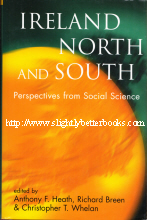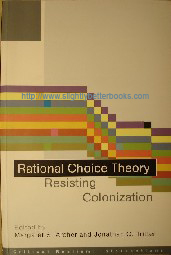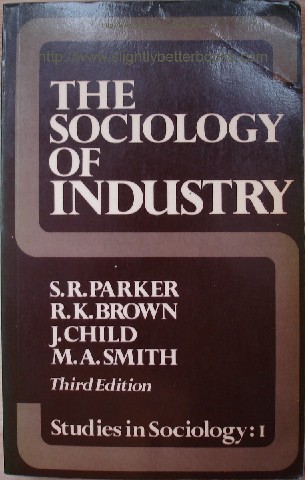

Slightly Better Books
Category Focus:Sociology
 |
Home | Contact | About Us |  |
|||||||||||||||||||||||||||||
|
|||||||||||||||||||||||||||||||||
| |
|||||||||||||||||||||||||||||||||
| Sociology | ||
| In Pictures: | ****Hyperlinked titles will take you to our copy on sale or prebuilt searches of copies on sale****
Useful Links: Titles to Look Out For: |
On Amazon: |
 1999, The British Academy, hbk In stock, click to buy for £12.99, not including post and packing (we have many brand new copies in stock) Alternative online retailers to try: Or click here to access our prebuilt search for this title on Alibris Or click here to access our prebuilt search for this title on Ebay
|
About this book: Have the two parts of Ireland been converging or diverging over time? And what implications do these patterns of change have for the future? In this first-ever systematic study of the social, economic and political development of the two Irelands since partition, a distinguished group of scholars from Ireland (North and South), Britain and America have worked together to provide answers that are essential for any understanding of current political events. There are chapters on economic development, political history, demography and migration, the religions of Ireland, gender differences, the family and the state of the labour market, industrial relations, education and social stratification, nationalism and political culture, and political behaviour. Some important areas of convergence are demonstrated, especially in fertility, but in other respects, the two Irelands remain distinct, with the North evolving some unique characteristics of its own Contents: |
Ireland North & South |
 2000, Routledge, pbk Sorry, out of stock, but click image to access prebuilt search on Amazon UK for this title Alternative online retailers to try: Click here for our prebuilt search for any edition of this book on Alibris Or click here to access our prebuilt search for this title on Ebay
|
About this book/synopsis: Can Rational Choice Theory explain all human behaviour? Rational Theory is put to the test in this volume, which represents an act of sociological resistance with thirteen contributions contesting its theoretical adequacy and demonstrating its inability to deal with empirical problems ranging from race, education, marriage decisions and homeworking to the underclass and crimes against humanity. Rational Choice theory has been flourishing in sociology and other disciplines, but contributors to this volume believe that it is inadequate not just for part of the decision-making process, but for all parts: that is of the person or persons making the decision; the process by which decisions get made and of the context within which decision-making takes place. There are three basic assumptions underlying rational theory on which this book focuses: Rationality - the theory's definition of rationality is restricted to 'instrumental rationality'. Rational choice theory is unable to deal with substantive rationality, which rather than being a means to an end is actually a commitment to those ultimate concerns which define who each of us are. What we care about most involves our emotionality and normativity, however neither affect nor norms can be satisfactorily incorporated into the RCT model of the cool, individualist bargain-hunter, looking to maximise a 'utility' who constitution remains mysterious. Individualism - the methodological individualism of Rational Choice Theory is not able to allow the conceptualisation of structure or agency; and it can't cope with the relations between them. Temporality - Rational Choice Theory presupposes the possibility of identifying people's preferences atemporally, because of their supposed stability. This is not borne out in reality - preferences have a history and a trajectory. When agents are involved, it is only by undergoing certain experiences that they are able to reflect on their past preferences. Through this learning process, the agent becomes a different person, but it is for precisely this reason that it then becomes more difficult for them to rectify and realize their preferences in the future. Similarly, the background of structural change conditions preference transformation over the same time span. Rational Choice Theory though stereotypes a stable preference order, thus denying the creative reflexivity of agents, as they respond to changes in their circumstances over time Contents: PART 1: Rationality 3. Homo Economicus, Homo Sociologicus and Homo Sentiens by Margaret S. Archer 4. Is rational choice theory 'unreasonable'? The neglected emotions by Simon J. Williams PART 2. Individualism 5. Social theory and the underclass: social realism or rational choice individualism? By Justin Cruickshank 6. (Ir)rational choice: a multidimensional approach to choice and constraint in decisions about marriage, divorce and remarriage by Kay Peggs and Richard Lampard 7. Switching allegiances: decisions by schools to 'opt out' to self-management by Jonathan Q. Tritter 8. Rational Choice or 'Hobson's Choice'? Intention and constraint in UK higher education by Andrew Parker Part 3. Temporality 9. 'I do': a theoretical critique of Becker's rational choice approach to marriage decisions by Ian Procter 10. Decision-making as a process over time: the careers of home-located cultural workers by Carol Wolkowitz 11. The decision not to commit a crime against humanity by Robert Fine and David Hirsh 12. 'Race, ethnicity and housing decisions: rational choice theory and the choice-constraints debate by Peter Ratcliffe Conclusion: Bibliography; Name Index, Subject Index |
2000, Routledge, pbk 2000, Routledge, hbk Other rational choice theory books of potential interest: Other Margaret S. Archer Books: |
 1980, George Allen & Unwin, hbk In stock, click to buy for £2.95, not including p&p Alternative online retailers to try: Click here for our prebuilt search for any edition of this book on Alibris Or click here to access our prebuilt search for this title on Ebay
|
About the Book: The book was first published in 1967, since which time the field of industrial sociology has developed very rapidly. The text was revised completely in 1972 and this new, extended and fully reset third edition includes assessments of recent research and theory, plus a fresh treatment of more long-standing issues. The book falls into three parts, corresponding to the three levels of sociological analysis. Part 1 considers the relationships between industrial and other institutions of society, such as education and the family. In Part II, the analysis moves to the internal structure of industrial organizations and the roles which individuals play in them. Part III covers what is sometimes called the sociology of occupations and deals with the work and non-work roles of individuals. The concluding chapters discuss questions concerning the relationship between industrial sociology and industrial society. About the Authors: At the time of publication, Dr. Parker was a Principal Social Survey Officer with the Office of Population Censuses and Surveys. Richard Brown was Reader in Sociology at the University of Durham and Dr. Child was Professor of Organisational Behaviour at the University of Aston Management Centre. Michael Smith was a Lecturer in Sociology at the University of Salford Chapters: Part One: Institutions and Systems 3. Industry and Education by S. R. Parker 4. Industry and the Family by S. R. Parker 5. Industry and Social Stratification by S. R. Parker 6. Industry, the Community and the Polity by S. R. Parker Part Two. Organisations and Roles 8. Approaches to Workplace Behaviour by R. K. Brown 9. Shopfloor Strategies and Reactions to Change by R. K. Brown 10. Management by J. Child 11. Organised Interest Groups by S. R. Parker Part Three: Aspects of Occupations 13. Work Involvement and its Alternatives by S. R. Parker 14. The Subjective Experience of Work by S. R. Parker 15. Questions of Procedure and Identity by J. Child 16. Industrial Sociology and Industrial Society by J. Child Bibliography; Index |
�
Other books of potential interest: Books on Sociology of Industry and the Family |
|
[top] | |
| [top] | ||